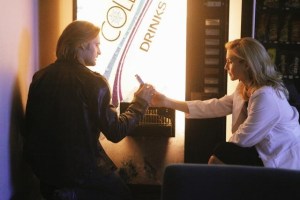
ABC
In the Lost podcast I posted Tuesday, Maureen Ryan, Ryan McGee and I hashed over how our thoughts on the finale had evolved over a couple days. Before the finale aired, I had considered following up a few days after the finale with a second review.
I’m not going to do that, yet anyway. In part, I’m just burned out on Lost analysis for now, and I’m not sure my views about the finale have changed much yet. I do have more problems with the plot aspects, but I get into those somewhat in the podcast. So I think I’m going to hold off for a while—quite a while, maybe until the DVD comes out. But if you have new or changed thoughts, post them here.
What I do want to look at is: does the finale, especially the Flash Sideways resolution, change my view of season 6 as a season? Short answer: Somewhat. Not for the better.
As I’ve written often, I began the season believing it was, in one sense, one big episode that we couldn’t wholly evaluate until it was done. It was structured around an unknown: the Flash Sideways universe, what it was, how “real” it was, and how it related to the larger narrative.
One problem with the Flash Sideways while it was unfolding was that it was hard to get invested in it, for many of the above reasons. Knowing now what it is, some of the stories and elements earlier in the season seem, in retrospect, more ingenious. (For instance, Juliet’s saying “It worked,” which turns out to be not a reference to the H-bomb but a last dying flash of her and Sawyer at the vending machine, which makes her last words even more touching and sweet.)
Many of the ways the Sideways worked, in other words, were neat. But were they necessary? To the storyline of season 6, obviously not. And as a journey for the characters themselves, they’re, at least, problematic.
The biggest problem is that, knowing that these are our characters in the afterlife (or in their last pre-death moments of consciousness, as Juliet’s dying words might indicate), their various stories and alternative realities—Jack as a dad, Ben as a teacher, &c.—read as a way of working through their problems and correcting the mistakes of their past. But I, at least, had spent five years thinking of the Island as a place where the characters tried to achieve redemption and correct the mistakes of their past. And Jacob re-iterated that this season: They needed the Island as much as it needed them.
So then what was the purpose of experiencing a post-life in which they worked through the same redemption issues? If the Island was for redemption, why have a Sideways way station, for, I don’t know, re-redemption?
Perhaps deeper philosophical minds than mine have a justification for that. But I can’t help but feel that the main reasons for the numerous Sideways stories were simply (a) to set up for the closing of the finale, (b) to create misdirection, enough of a semblence of “real life” that no one would guess what the Sideways really was and (c) to fill time, because the structure of Lost requires a flash-something.
Now would I have gotten rid of it? I don’t know. The finale was powerful, cathartic and fitting, and I can’t say I know how to set it up differently. But the fact remains that it made for stretches of the final season that were stilted and hard to identify with. (With some exceptions, like “Happily Ever After.”) The finale worked as well as it did partly because it restored Lost’s original emotion and energy to a season that often felt somber and lacking in narrative drive. (Not that it had nothing fun or inventive going for it. Five words: Sawyer and Miles, buddy cops! Two more: Squirrel Baby!)
And I continue to think that making Jacob and MIB central to the story hurt it, because they were never as well written as characters as the rest of the cast were; they had no real voice or verve to them the way even villains like Ben did, and that helped put a damper on the season overall. The attempt to humanize them in “Across the Sea” was way too little, way too late. Again, one thing the finale had going to it was that it was kind of a corrective to this: Jacob was off the scene, as was MIB, for roughly the final hour.
None of this is damning; Cuselof set themselves a task with a very high degree of difficulty, and in a way I’m impressed they pulled off as much as they did. And one caveat: I say this without having yet gone back and watched the rest of season 6 again. (Believe it or not, my job requires me to watch shows other than Lost from time to time.) So this is subject to change upon rewatching. But at least upon thinking back, the finale—much as I liked it in itself—didn’t make the season that preceded it retrospectively mind-blowing. More like throat-clearing.
So my current tally on Lost: five great years, followed by a weaker (but often very good) season that a strong finish partly made up for. But I’ll revisit all this later in the summer, and who knows what I’ll think by then. In the meantime, let me know if your opinion of the finale, of the final season, or of Lost as a whole, have changed since Sunday night.


